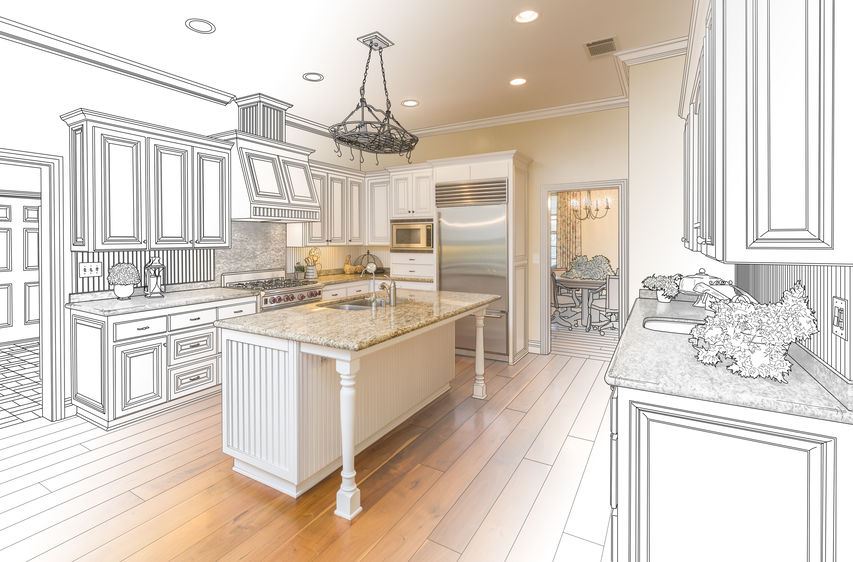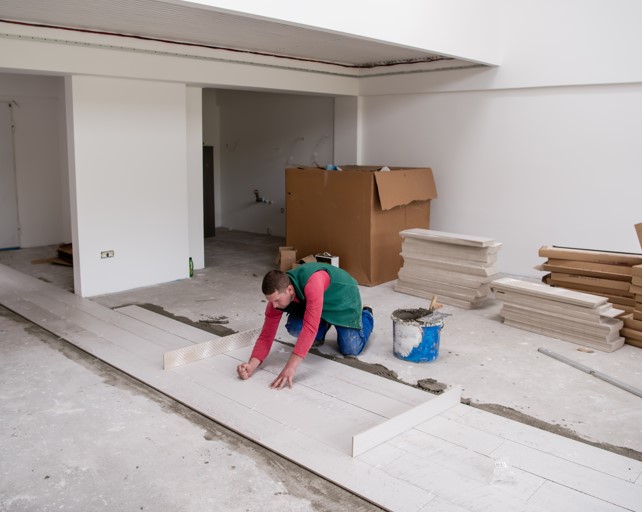
Embarking on a home renovation project can be both exhilarating and intimidating, particularly for new homebuyers in the competitive market of today. With metro areas like NJ seeing a substantial shift from city living to the spacious suburbs, many homeowners are choosing to invest in properties that require a bit of tender loving care. Whether it’s due to lower inventory or the desire to create something truly personal, the draw towards renovation is undeniable.
MSC Enterprises, specialists in building and real estate development in Monmouth and Ocean counties, understands that a house isn’t just a structure; it’s where your life unfolds. This blog post is curated with insights from our extensive experience in transforming spaces into quality homes that our clients adore.
Here are some essential dos and don’ts to guide you through your home renovation adventure.
Do: Assess the Current Condition of Your House
The best way to get hold of everything that needs to be done is to start with the basics. It begins by assessing your house to get an idea of what needs to be replaced and what is still in perfect condition.
A licensed home inspector will scour the basement and the attic checking for leaks, dampness, or any damage. They should also examine your roof, electrical panels, and plumbing system to ensure everything operates efficiently.
Although many people have mixed feelings about having a house survey, it is a good way to get an idea of areas that need renovation. However, you should not rely entirely on a survey, as it does not cover personal preferences.
Make a list of what you feel you want to change about your décor and get more ideas on how to go about it. Here is a great article if you’re wondering about Things to Know Before Closing on a New Construction Home.
Do: List and Sort Priorities
Once you have made a list of the areas you think should be renovated, you need to sort and group everything into categories based on the task. This may include plumbing, plastering, electrics, cabinetry, or painting & decorating.
You need to set priorities based on what is urgent, not urgent, can be done anytime, or needs to be done as soon as possible. Please keep in mind that there are projects that need to be done sooner rather than later. Bigger problems related to plumbing and electrics need to be handled first before you paint or add final touches to your décor.
Start with major tasks that involve changing room layouts, knocking down or building new walls, or fixing water problems. Afterward, proceed with other little projects such as windows, plastering, tiling, floors, and finally painting and decorating.
Do: Hire a Professional
Complex tasks that you cannot handle on your own should be left for a professional to avoid expensive costs of future repairs on things that were not installed correctly. Many projects in a home renovation usually affect others and may require the knowledge and experience of a skilled contractor if you want to achieve perfection.
For example, if you are knocking down walls or rearranging your layout, you might need sorting some electric cables or plumbing pipes. Although the results from your home survey may dictate the order of your priorities, it is crucial to decide what is important for you.
This may involve determining the project you want to finish first, what can improve your lifestyle, which project is most urgent, and the areas you can spend money most without interfering with your budget.
The Don’ts – Here’s What to Avoid When Starting a Home Renovation.
Figuring Out Your Budget ‘Along the Way’
Never assume that things will just blend in as soon as you start your renovation project. If you do not have a budget, there are high chances of spending more than what you intended to.
You would not want to delay your project because you lacked enough money to purchase materials or pay your laborers. Even if the proportion of your expenses can be flexible, it is still important to work out the schedule in advance.
Skimping on Materials
It’s tempting to cut corners on aspects of your renovation that aren’t immediate show-stoppers. Yet opting for lower-quality materials in less visible areas often leads to spending more down the line on repairs and replacements. Remember, what’s out of sight should not be out of mind.
Since the reasons for leaving the city outweigh the concerns they may have about small windows, an outdated kitchen and a deck that may be in disrepair – home buyers may settle on a property they like and a house with ideas for a potential home renovation spinning around in their head as they sign the closing paperwork.
Buying a home that needs renovation work can be overwhelming since there are so many hidden expenses and uncertainties involved. It can be more confusing when you are presented with many renovation projects at once without any idea of where to begin. Before you put your plan into effect, it is important to analyze your reasons, needs, and the estimated budget for your renovation. This article gives information on the things you need to do before embarking on a house renovation project.
The Concept of Floor Space
When contemplating a home renovation, the concept of floor space is paramount, as it ultimately dictates the functionality and flow of your living areas. Optimizing square footage can transform a cramped space into an open, inviting home with room to breathe, work, and play.
Implementing clever design strategies is key to maximizing floor space. For example, utilizing multi-purpose furniture, such as ottomans with storage or wall beds, can create more usable living area without the need for additional square footage. Built-in shelves and cabinetry can also minimize the need for bulky furniture, keeping floor space open and pathways clear.
Moreover, consider the use of visual tricks like light colors, ample lighting, and large mirrors to make rooms appear larger. And remember, sometimes less is more – decluttering and a minimalist approach to decor can help in maintaining open, unobstructed spaces that enhance the sense of spaciousness within your home.
Overall, careful planning and creative design can ensure that every inch of your renovation project works hard to create the open, functional, and welcoming home you desire.
Basement Renovation Ideas
Basements often represent an untapped gold mine for homeowners looking to increase the value of their property. Transforming a dark, underused basement into a functional, livable space can substantially boost a home’s market appeal and overall square footage.
Renovations that create additional family rooms, home offices, or even rental suites can offer a significant return on investment by increasing the usable area.

Here are some tips for renovating your basement into a functional area of your home:
- Assess and Improve the Basics: Before any aesthetic work begins, address any moisture issues, and ensure your basement is waterproofed. Proper insulation and soundproofing will also enhance comfort and utility.
- Plan Your Layout Wisely: Consider the flow of the space and the activities it will support. Open plan layouts are popular but include thoughtful placement of electrical outlets and lighting to maximize versatility.
- Maximize Natural Light: While basements are notoriously low on natural light, enlarging small windows or adding new ones where possible can aid in transforming a basement from gloomy to welcoming.
- Focus on Flooring: Since basements are prone to dampness, choose flooring that can handle the environment. Options like vinyl planks or tiles can offer the look of wood or stone but with better moisture resistance.
- Incorporate Built-in Storage: Smart storage solutions can keep a basement organized and clutter-free. Consider incorporating built-ins or custom shelves that make the most of the available space.
- Use Light Colors & Adequate Lighting: Pale wall colors paired with plenty of artificial lighting can make a basement space feel brighter and more substantial.
By implementing these tips, you can turn your basement into an attractive and practical extension of your living area, adding both comfort and value to your home.
Bathroom Renovations
Bathroom renovations can have a profound impact on a home’s comfort level and resale value. While upgrading, homeowners should delve into the design with longevity and universality in mind. Here are some key considerations to guide your bathroom renovation:
- Esthetics and Functionality: Choose durable and timeless finishes that will withstand trends and wear. Consider the layout for ease of movement and access to fixtures.
- Energy Efficiency: Eco-friendly fixtures like low-flow toilets and showerheads save water and reduce utility bills, making your home more attractive to future buyers.
- Adequate Storage: Plan for sufficient cabinetry and shelving to ensure a clutter-free and organized space.
- Quality Ventilation: Good ventilation is crucial to prevent mold growth and maintain air quality, which is especially important in a bathroom setting.
- Lighting: Adequate and flexible lighting options are essential. Aim for a combination of task, ambient, and accent lighting.
The impact of bathroom updates on resale value cannot be overstated. A well-designed bathroom can be a deal-maker for potential buyers. It is often seen as an indicator of overall home care and quality. Clean lines, neutral palettes, and modern fixtures usually resonate well on the market, making such renovations a wise investment for any homeowner considering future resale.
Kitchen Remodeling Ideas
The central hub of the home, the kitchen, is not just a place for cooking and dining but a multifunctional space where design meets function. One key element that has become a centerpiece in modern kitchen design is the kitchen island.
Serving as a focal point, the island is a versatile feature that provides additional counter space, storage, and seating areas. It also doubles as an informal dining area, a preparation station, and a gathering spot for family and friends, making it a multifunctional asset to any kitchen.
Open shelving is another trend that brings benefits to the kitchen’s aesthetics and functionality. Open shelves offer an airy feel to the kitchen and make it appear larger. They provide ease of access to frequently used items and an opportunity to display decorative pieces, cookbooks, and fine china which adds a personal touch.
However, careful consideration is essential to maintain a balance between open shelving and the potential for clutter. Making strategic use of open shelves can modernize the kitchen space, proving useful and visually appealing.
Planning Your Next Project
When embarking on your next remodeling project, it’s crucial to plan meticulously to ensure a smooth process and successful outcome. Start by defining your goals and budget, considering both immediate needs and long-term implications like potential resale value. Thorough preparation involves researching current design trends, yet prioritizing timeless appeal and choosing upgrades that are likely to pay off in the future.
- Set Clear Goals: Understand what you want to achieve with your renovation. Clarify whether it’s about improving functionality, aesthetic appeal, or increasing property value.
- Budget Wisely: Determine a realistic budget that includes materials, labor, permits, and a contingency for unexpected costs.
- Consult Professionals: Even if you’re a savvy DIYer, consult with architects, interior designers, or contractors for insights on the latest regulations, materials, and potential pitfalls.
- Consider Longevity: Choose materials and designs with proven durability and timelessness to appeal to future buyers.
- Focus on Key Areas: Invest in high-impact areas like kitchens and bathrooms that significantly influence resale value.
- Plan for the Future: Consider implementing energy-efficient features and smart home technology that may become standard expectations in the housing market.
By being strategic and forward-looking, your remodeling project can enhance both the joy of your living space today and the economic returns tomorrow.
Is A Home Renovation In Your Future?
As you wrestle with living space layouts, ponder over basement remodel ambitions, and scout dining room inspirations, keep these tips at the forefront of your planning. Renovating can redefine not just your floors and walls, but your whole experience of ‘home.’ At MSC Enterprises, it’s our passion to create spaces that resonate deeply with those who inhabit them.
For more enlightened renovation ideas, smart remodeling projects strategizing, and all things related to creating a home you love, stay tuned to our insights right here in Monmouth and Ocean County, New Jersey.
For the aspiring homemakers ready to roll their sleeves up, remember: renovate wisely, and your house will not just be a living space but a story in the making, a testament to the life lived within its remodeled walls.

